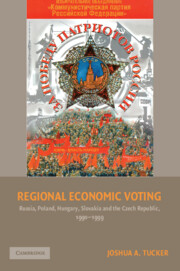Book contents
- Frontmatter
- Contents
- List of Tables
- Acknowledgments
- Party Acronyms and Candidate Abbreviations
- 1 INTRODUCTION
- 2 ECONOMIC CONDITIONS AND ELECTION RESULTS
- 3 COMPARATIVE CROSS-REGIONAL ANALYSIS
- 4 PAIRED CASE STUDIES
- 5 THE INCUMBENCY HYPOTHESIS
- 6 THE NEW REGIME HYPOTHESIS
- 7 THE OLD REGIME HYPOTHESIS
- 8 COMPARATIVE ANALYSIS
- 9 ECONOMIC VOTING AND POSTCOMMUNIST POLITICS
- Appendix I NATIONAL ELECTION RESULTS
- Appendix II REGRESSION RESULTS AND DOCUMENTATION
- Appendix III ESTIMATED DISTRIBUTIONS OF FIRST DIFFERENCES
- Appendix IV PERCENTAGE OF POSITIVE SIMULATIONS BY PARTY
- Works Cited
- Index
- Titles in the series
6 - THE NEW REGIME HYPOTHESIS
Published online by Cambridge University Press: 24 November 2009
- Frontmatter
- Contents
- List of Tables
- Acknowledgments
- Party Acronyms and Candidate Abbreviations
- 1 INTRODUCTION
- 2 ECONOMIC CONDITIONS AND ELECTION RESULTS
- 3 COMPARATIVE CROSS-REGIONAL ANALYSIS
- 4 PAIRED CASE STUDIES
- 5 THE INCUMBENCY HYPOTHESIS
- 6 THE NEW REGIME HYPOTHESIS
- 7 THE OLD REGIME HYPOTHESIS
- 8 COMPARATIVE ANALYSIS
- 9 ECONOMIC VOTING AND POSTCOMMUNIST POLITICS
- Appendix I NATIONAL ELECTION RESULTS
- Appendix II REGRESSION RESULTS AND DOCUMENTATION
- Appendix III ESTIMATED DISTRIBUTIONS OF FIRST DIFFERENCES
- Appendix IV PERCENTAGE OF POSITIVE SIMULATIONS BY PARTY
- Works Cited
- Index
- Titles in the series
Summary
As described in Chapter 2, the Transitional Identity Model is based on the premise that economic conditions affect parties' electoral fortunes based on their Transitional Identity, as opposed to their position in or out of the current government. The model yields two hypotheses. In Chapter 7, I assess the empirical support for the Old Regime hypothesis, which predicts that Old Regime parties should do better where economic conditions are worse. In this chapter, I examine the degree of empirical support for the New Regime hypothesis, which predicts that New Regime parties should enjoy more electoral support in regions of the country where economic conditions are better.
Overall, there is significantly more empirical support for the New Regime hypothesis than there is for the Incumbency hypothesis. Of the forty New Regime parties in the study – see Table 6.1 for coding – there is strong empirical support for the New Regime hypothesis in twenty-five of these cases, or 63% of the time. Moreover, there is only one case in the entire study in which we are at least 90% confident that the candidate performed better when the economy was worse. There is support for the hypothesis across a wide variety of contexts, including presidential and parliamentary elections, elections in Russia and East-Central Europe, and elections that occurred throughout the decade. Interestingly, the hypothesis generates the least support in Slovakia, a point that will be discussed in greater detail later in this chapter.
- Type
- Chapter
- Information
- Regional Economic VotingRussia, Poland, Hungary, Slovakia, and the Czech Republic, 1990–1999, pp. 184 - 214Publisher: Cambridge University PressPrint publication year: 2006



